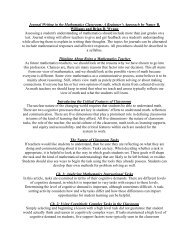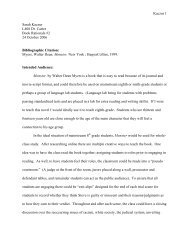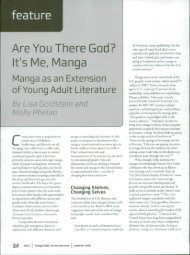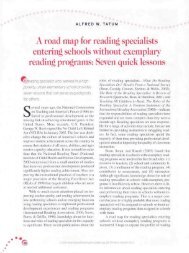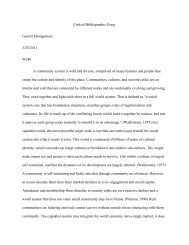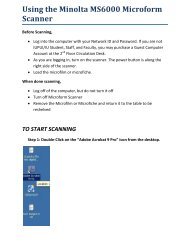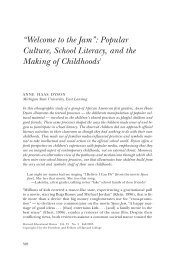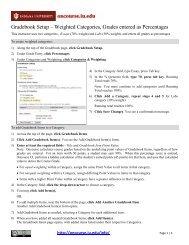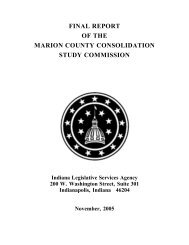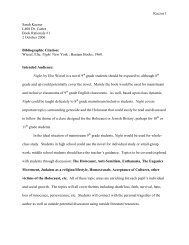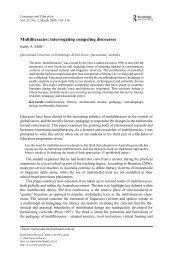Grauerholz 2003 Assessing critical thinking sociology.pdf - Oncourse
Grauerholz 2003 Assessing critical thinking sociology.pdf - Oncourse
Grauerholz 2003 Assessing critical thinking sociology.pdf - Oncourse
- No tags were found...
You also want an ePaper? Increase the reach of your titles
YUMPU automatically turns print PDFs into web optimized ePapers that Google loves.
CRITICAL SOCIOLOGICAL THINKING 495and in class participation. As an instructionaltool, the scale could be used as ascoring rubric for essay exams, debates, orother student work. Secondly, because thescale presented here reflects some of thekey components of <strong>critical</strong> sociological<strong>thinking</strong>, it can be used to guide curriculumdesign by identifying key learning goals thatshould be addresssed. Third, when usingthis scale to assess students' work, we canidentify gaps in our teaching. For instance,it became clear to the instructor of thecourses used in this study that greater attentionneeded to be paid to cross-cultural factorsafter realizing so few students offeredsuch evidence in their final exams. We believestudents must be taught how to think<strong>critical</strong>ly and sociologically in order to demonstratesuch skills on an outcome measure(Logan 1976); thus, when students performpoorly on one or more of the items discussedhere, it may be an indication of areasthat need to be more carefully addressed inour teaching.In conclusion, this study represents aninitial attempt to clarify what <strong>critical</strong> <strong>thinking</strong>in <strong>sociology</strong> involves and to create empiricalmeasures of <strong>critical</strong> sociological<strong>thinking</strong>. Our efforts discussed here representa concerted effort but hardly a definitiveone. More research is needed to helpimprove our understanding and measurementof this important learning outcome.REFERENCESBaker, Paul J. 1981. "Learning Sociology and<strong>Assessing</strong> Critical Thinking." Teaching Sociology8:325-63.Bean, John. <strong>2003</strong>. Personal communication.February 27.. 1996. Engaging Ideas. San Francisco,CA: Jossey-Bass.Bengston, William F. and John W. Hazzard.1990. "The Assimilation of Sociology intoCommon Sense: Some Implications for Teaching."Teaching Sociology 18:39-45.Bidwell, Lee D. Millar. 1995. "Helping StudentsDevelop a Sociological Imagination ThroughInnovative Writing Assignments." TeachingSociology 23:401-6.Browne, M. Neil and James L. Litwin. 1987."Critical Thinking in the Sociology Classroom:Facilitating Movement From VagueObjective to Explicit Achievement." TeachingSociology 15:384-91.Geertsen, Reed. <strong>2003</strong>a. "Re<strong>thinking</strong> Thinkingabout Higher-Level Thinking." Teaching Sociology31:1-19..<strong>2003</strong>b. Personal communication. April 7.Goldsmid, Charles A. and Everett K. Wilson.1980. Passing on Sociology: The Teaching ofa Discipline. Washington, DC: ASA TeachingResource Center.Green, Charles S. III and Hadley G. Klug. 1990."Teaching Critical Thinking and Writingthrough Debates: An Experimental Evaluation."Teaching Sociology 18:462-71.Logan, Charles H. 1976. "Do SociologistsTeach Students to Think More Critically?"Teaching Sociology 4:29-48.McPeck, John E. 1985. "Critical Thinking andthe 'Trivial Pursuit' Theory of Knowledge."Teaching Philosophy 8:295-308.. 1990. Teaching Critical Thinking: Dialogueand Dialectic. New York: Routledge.Nelson, Craig E. 1999. "On the Persistence ofUnicorns: The Trade-Off between Content andCritical Thinking Revisited." Pp. 168-84 inThe Social Worlds of Higher Education: Handbookfor Teaching in a New Century, edited byBernice A Pescosolido and Ronald Aminzade.Thousand Oaks, CA: Pine Forge Press.Norris, Stephen P. and Robert H. Ennis. 1989.Evaluating Critical Thinking. Pacific Grove,CA: Midwest Publications.Paul, Richard. 1993. Critical Thinking: WhatEvery Person Needs to Survive in a RapidlyChanging World, edited by Jane Willsen andA.J.A. Binker. Santa Rosa, CA: Foundationfor Critical Thinking.Ruminski, Henry J. and William E. Hanks.1995. "Critical Thinking Lacks Definition andUniform Evaluation Criteria." Journalism andMass Communication Educator. 50:4-11.Shepelak, Norma J., Anita Curry-Jackson, andVernon L. Moore. 1992. "Critical Thinking inIntroductory Sociology Classes: A Program ofImplementation and Evaluation." TeachingSociology 20:18-27.Stoecker, Randy, Mary Schmidbauer, JoanMullin, and Michelle Young. 1993."Integrating Writing and the Teaching Assistantto Enhance Critical Pedagogy." TeachingSociology 21:332-40.Thompson, Becky and Sangeeta Tyagi. 1993."Multicultural Education and the SociologicalImagination." Teaching Sociology 21:192-96.



